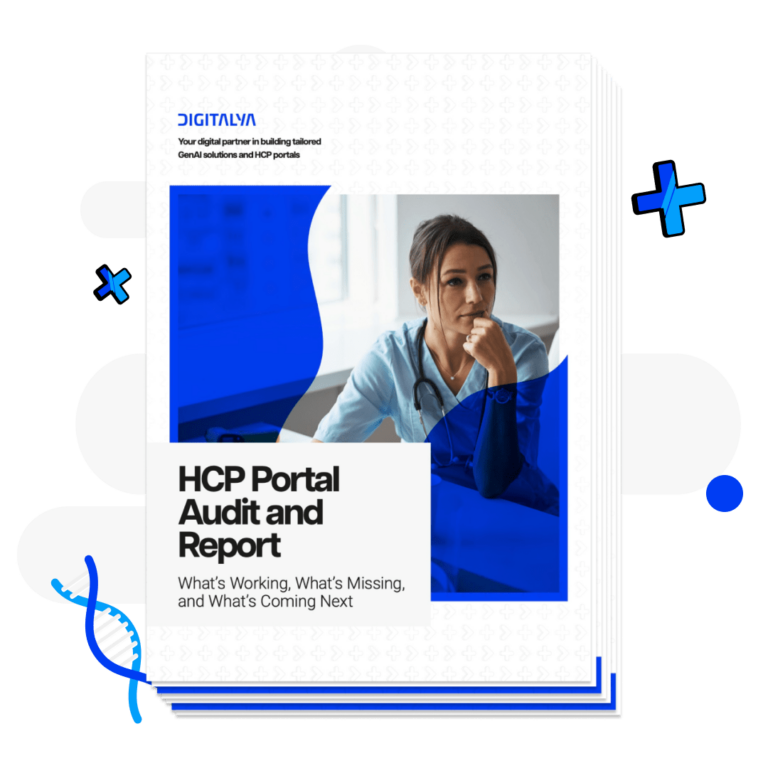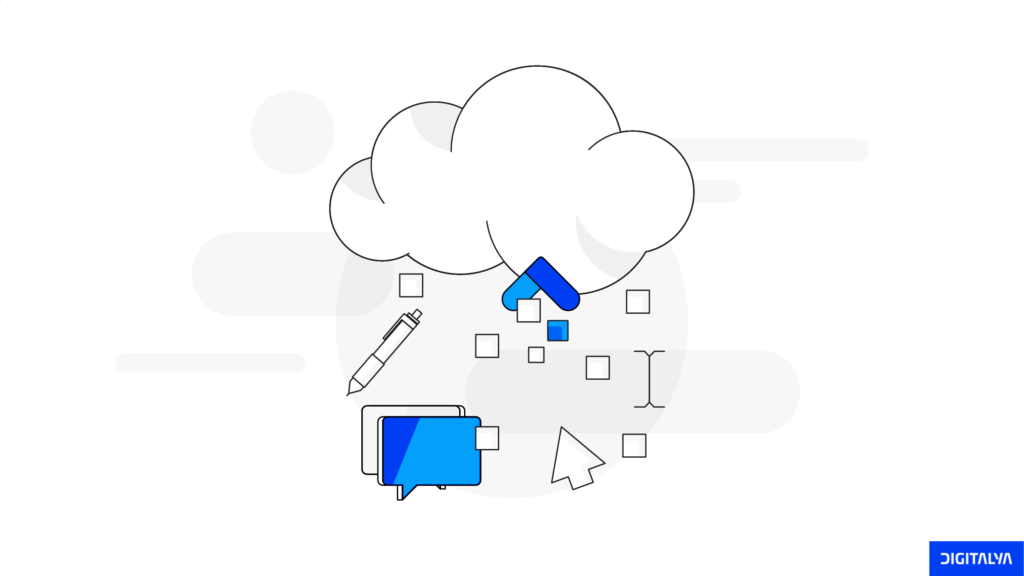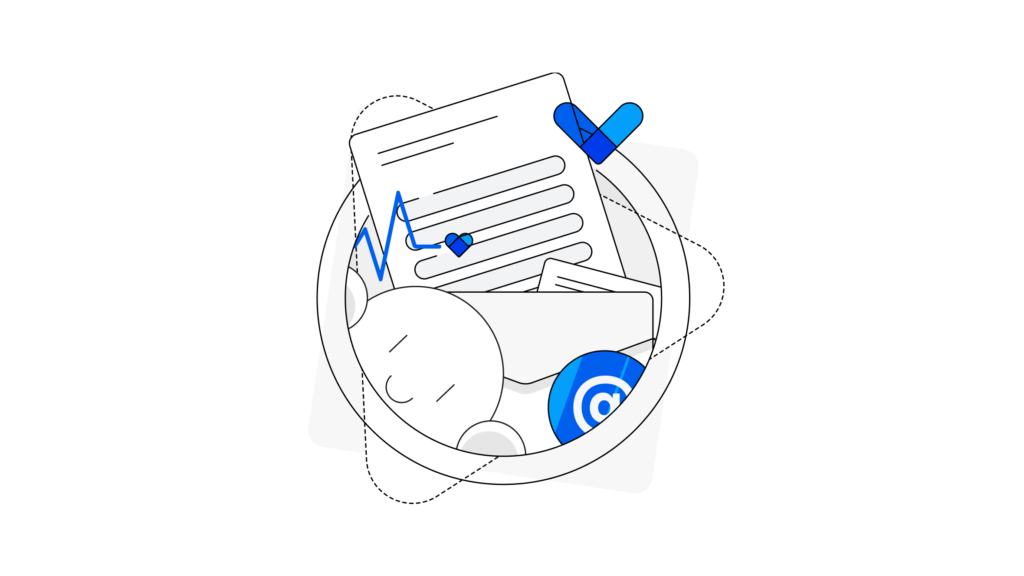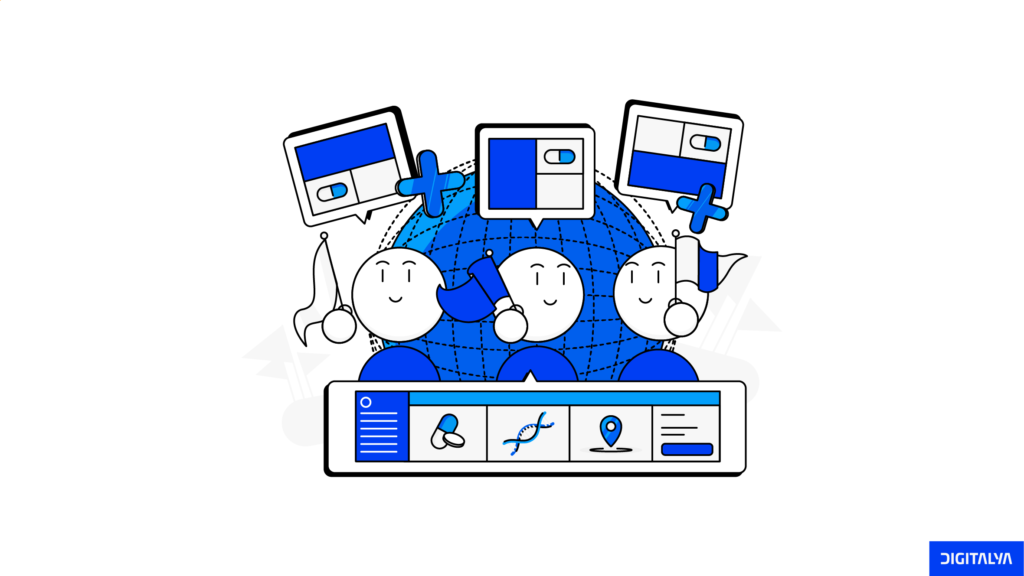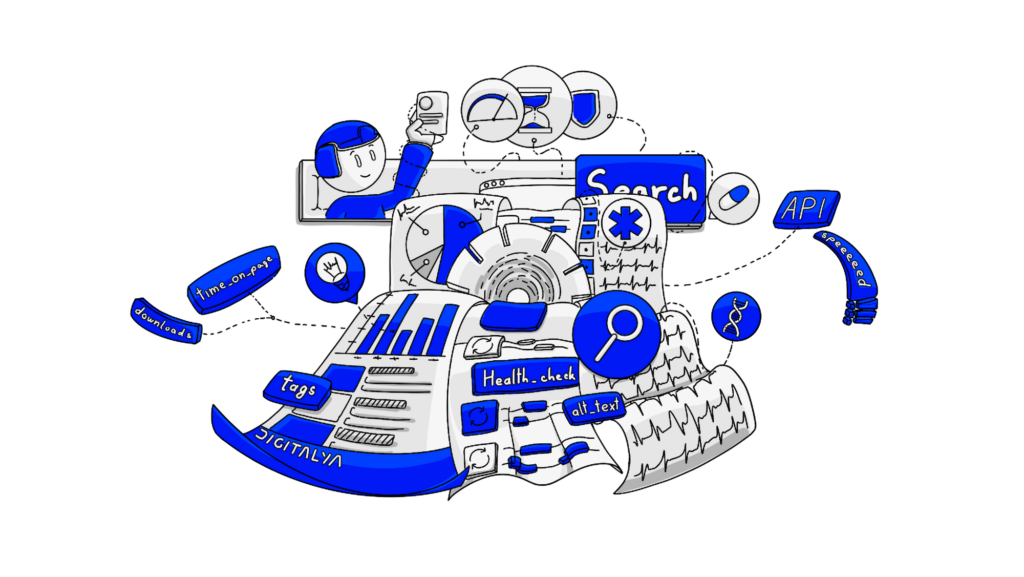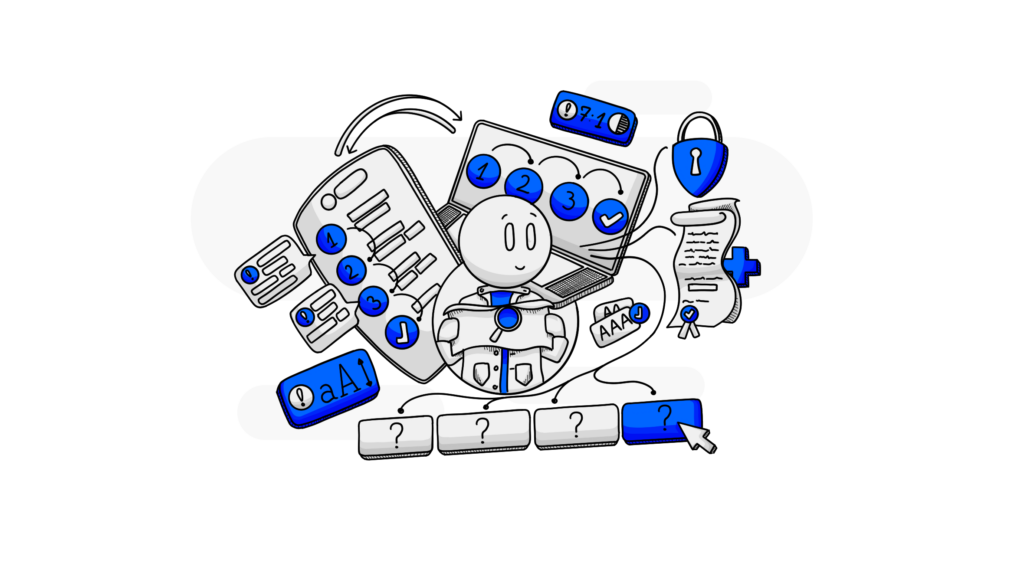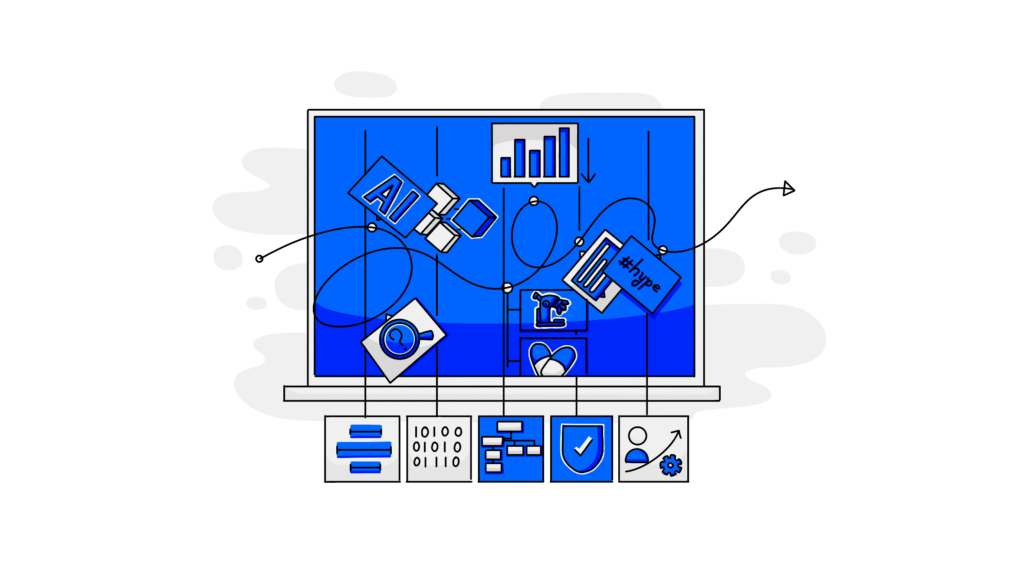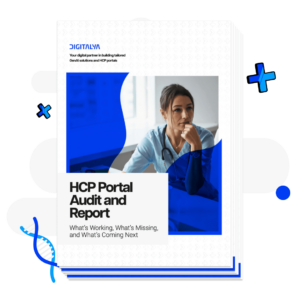I don’t think there’s a place where you can go online and not hear about the rise and developments in AI.
Not to mention, every big tech company is rapidly using and launching AI-based products or services to meet the hype.
It seems like every industry and workplace will adopt, use, or be affected by AI. This AI revolution might come sooner or later, depending on the industry — some already rely on these machine learning systems, while others, more heavily regulated (like pharma), will have a more challenging time applying AI.
Even given the particularities of the pharmaceutical industry, you still can’t ignore AI. So the questions arise: What is AI’s potential in pharmaceutical marketing? Does AI in pharma make sense? How can you leverage it to achieve greater results or deliver better customer experiences?
Let’s start from the beginning.
The evolution of AI in pharma
As with every application of artificial intelligence that has machine learning at its core, it needs a lot of data to be trained and works best when analyzing vast amounts of information to discover patterns or draw conclusions that were previously difficult to make.
From this point of view, pharmaceutical companies are best equipped to leverage AI and integrate it into their workflow, as they have a long history around big data.
Big Data has been at the core of drug development, clinical trial, and drug manufacturing since the beginning. The same can be said for sales and marketing efforts that use market research and the analysis of customer data to launch marketing campaigns.
Integrating AI was the logical next step for the pharmaceutical industry. And we already see massive investment in this area, growing from 600M in 2014 to 6.6B in 2021.
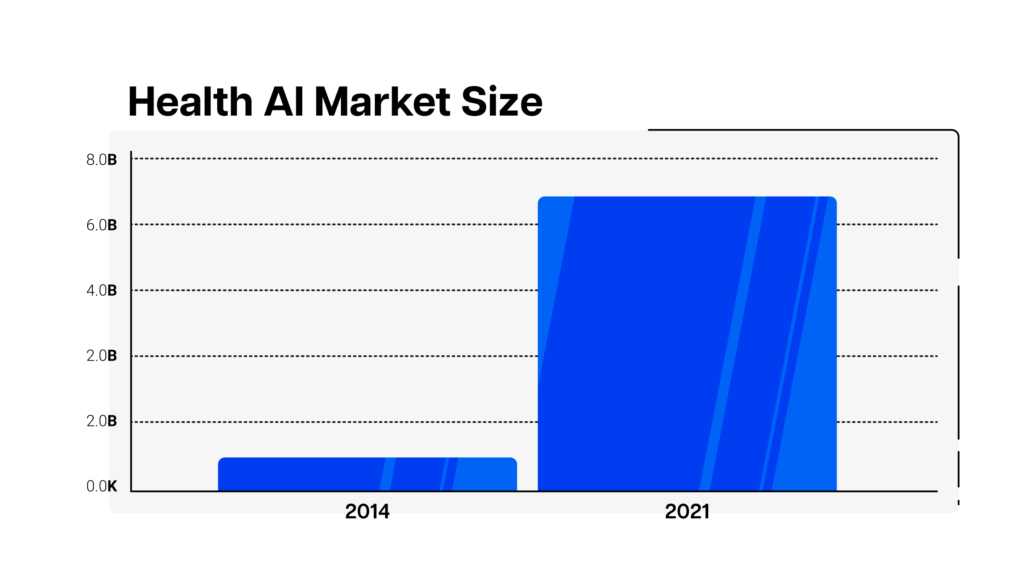
Google states that the healthcare and life sciences industry is one of the first to benefit from it by using it for “patient health record analysis and insights, outcome forecasting and modeling, accelerated drug development, augmented diagnostics, patient monitoring, and information extraction from clinical notes.”
AI came forward with its capability of analyzing huge data sets to uncover trends and answer critical questions, such as what patients are more likely to react to a specific treatment positively, and then generate predictive insights on appropriate responses or interpretations of ongoing scenarios.
Big companies are already using it. For example, AstraZeneca has collaborated with more than 100 prominent Pharma partners and AI providers over the last 7 years. One of the most significant areas where they use machine learning is in the identification and development of novel therapeutics.
The same is true for Pfizer. Boris Braylyan, the Vice President and Head of Information Management at Pfizer, states that, with the help of machine learning, they moved from storing and searching data to concentrating on true mining of the data for recommendations.
Drug development is one of the first areas where the use of AI and machine learning, in particular, provided tremendous benefits.
But AI is also proving great at analyzing large amounts of customer and audience data from the multiple channels and touchpoints generated by the commercial and marketing departments. It can be a great way to uncover new patterns that lead to better strategies and improved experiences for HCPs and other target audiences.
For this article, I will talk about using AI in commercial and marketing activities and point out how you can best leverage it despite the various regulations you need to follow.
The uses for AI in pharmaceutical marketing teams
There are a few main areas in which AI in pharma marketing can bring huge benefits. Let’s take them one by one.
1. Use AI for personalization in HCP portals
Generative AI, as it stands now, is not 100% suitable for creating brand-new content as its model (based on probabilities) can lead to generating content that looks plausible but is incorrect.
Fortunately, there are other forms in which AI can help you keep HCPs engaged on your portal while ensuring information accuracy and regulation compliance.
Here are some ways of leveraging AI in HCP Portals:
Provide tailored related content
41% of physicians don’t visit pharma websites more often due to the time it takes to find the needed information. When building your HCP portal, you should prioritize user experience, making it easy for healthcare professionals to access and navigate it.
You can use an AI tool to analyze the content users are interested in and showcase dynamic content in your HCP Portals with text or video recommendations that bring the highest engagement chances.
Automatically generate summaries
AI technologies can provide an easy way to generate summaries of relevant content. Imagine simply selecting a huge chunk of text, clicking a button prompt, and having it all summarized. This way, HCPs can quickly get the essential info and have time to consume more content.
Insert relevant images tailored to local markets
AI images can help meet local expectations — accounting for ethnicity, gender, height, weight, clothing, expression, or other factors. This is the next level in localization — in which you not only make the text fit the context you operate in but also the visual elements.
This will increase engagement and make your content more relatable by tailoring it to the HCP’s location.
Repackage existing content into other formats
For example, use AI to take the information in your videos and transform them into easy-to-read summaries, articles, or downloadable resources. This way, HCPs can consume content in a way that keeps them engaged.
Add chatbots and virtual assistants
Implement AI-powered chatbots or virtual assistants to help HCPs get answers to their questions faster and find relevant content with ease. These can also be a way to answer frequently asked questions, which improves HCP’s experience on your portal and can drive them to come back.
2. Leverage modular content with AI
Modular content is a versatile approach that streamlines content creation. It involves pre-approved ‘modules’ with text, graphics, and more, each with specific usage rules.
These modules can be mixed and matched to convey various messages and deployed across different channels (e.g., social media, approved emails, eDetailing, etc.). This accelerates asset development and simplifies approvals for the MLR teams, benefiting marketing and regulatory teams.
Their basic functionality looks like this:
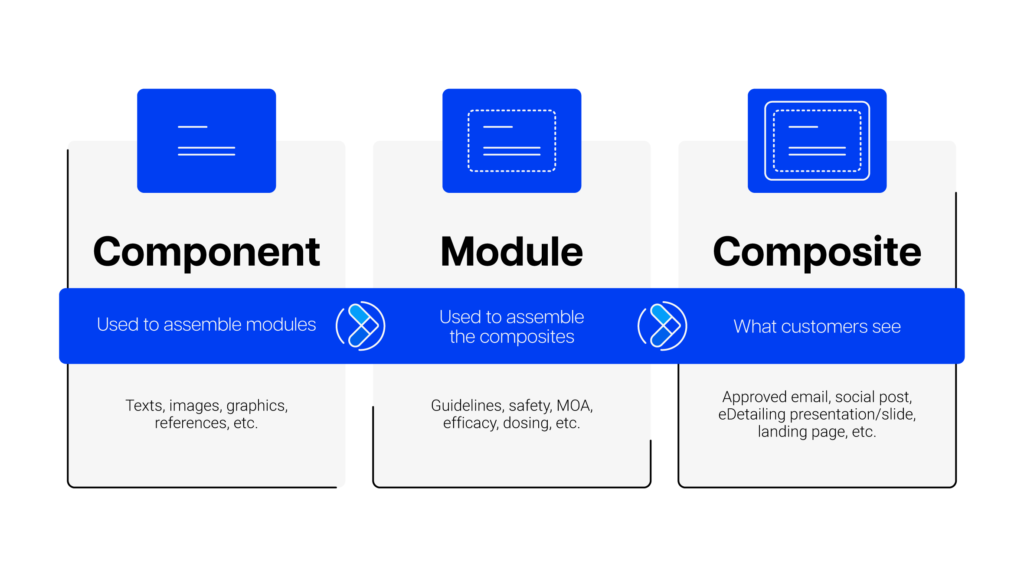
Among the advantages of modular content are:
- Reduced time to market for your assets;
- Better targeting by matching the modular content with the target audience;
- Faster MLR by removing duplicate work (reviewing assets with similar messages);
- Simplicity for creating content as all assets are already there;
- Reusable content across multiple channels;
- Ensuring brand consistency across channels;
- Lower risk of breaking compliance.
How can AI help you in creating or distributing modular content?
Once your modular content is ready, it must go into a digital asset management solution (DAM), representing the single source of truth for marketing and commercial teams.
Now, the struggle comes from finding the right content among all the pieces stored and fitting multiple content modules together to create a compelling message that will take various forms (emails, landing pages, presentations, documents, social media posts, etc.) depending on the customer journey.
This is where the integration of AI can prove beneficial.
AI can become the content assembly genius that searches, finds, and puts together the right content from your DAM and adapts it to the channel you’re using. The best fit is using AI ‘post-MLR’ to immensely increase the efficiency and speed of creating content for your audience.
The best part is you can use natural language to tell an AI what you want to create (email, presentation, page section) and who’s it for. You now have the trifecta: an accessible UI, modular content, and the amazing ability of AI to search, find, and build the necessary content.
You can easily imagine how simple and intuitive the workflows will be and the speed at which you can deliver content at scale while also being compliant.
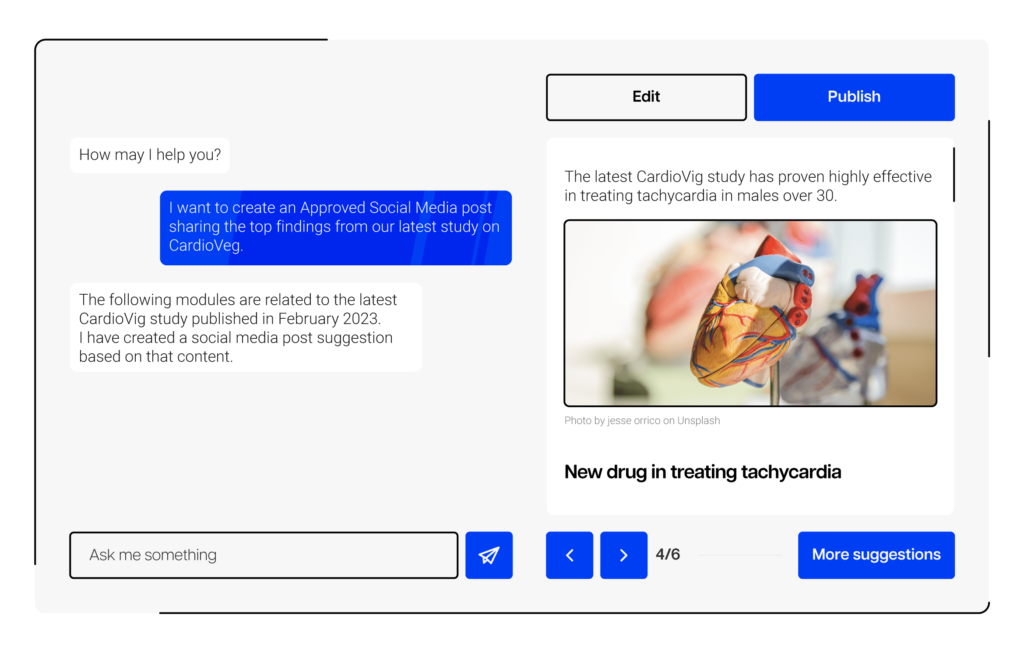
3. Optimize internal commercial and marketing processes with AI
There are numerous other ways in which AI can help in pharma marketing and commercial activities to deliver improved results. Here are some good examples.
Use AI for predictive analytics
Now that machine learning and AI are more accessible than ever, you can use them to anticipate market trends, drug demand patterns, and customer engagement opportunities. This proactive approach enables you to allocate resources effectively and adapt your strategies accordingly.
Pharma companies can also use AI to gain valuable insights into healthcare professional (HCP) behavior to fine-tune their omnichannel marketing strategies and build useful pharma and healthcare web apps and HCP portals. For instance, predictive analytics can help identify HCPs who are more inclined to engage with specific content types and help with delivering personalized marketing messages.
Make better decisions with the help of AI
AI can extract valuable industry insights from vast datasets, uncovering hidden patterns not readily discernible to humans. AI models can assist in strategic planning and decision-making processes like forecasting, risk analysis, and customer segmentation. This accelerates informed decision-making and helps you achieve better outcomes.
Greater integration between sales reps and marketing
AI models can help bring together data from various sources and score and prioritize your audience based on their progress in the customer journey and their customer profiles. This automated lead scoring system can be the basis for deciding on the best possible path forward for all teams involved.
Applying AI can lead to uncovering audiences ready for certain commercial actions by typing in simple inputs and letting the AI put the data together. This will, for example, reduce the time needed to find and sort the audiences ready for a field representative visit.
Automate internal tasks and processes
The first step is identifying repetitive and rule-based activities. Then, you must choose appropriate AI tools, integrate data sources, and create a clear process map. AI technology, such as RPA (Robotic Process Automation), works great for automating mundane tasks as soon as you integrate them with existing systems.
4. Use AI for MLR content assets approval
Although it might not seem intuitive to involve AI in such a critical process, there are several ways in which MLR teams within pharmaceutical companies can benefit from this technology.
AI for Automated Content Review
AI-powered tools can help create an automated content review and analysis system. Natural language processing (NLP) algorithms can quickly scan and evaluate content for compliance with medical, legal, and regulatory guidelines and recommend potential alternatives.
Content Recommendations
AI-driven content recommendations can suggest alternative language or content variations that are more likely to receive approval. This can speed up the content review process by presenting pre-vetted options.
Intelligent search using natural language
There are many times when you know what you are looking for but struggle to choose the suitable filters that get you there. The advancements in natural language processing mean you can use AI-based search capabilities to quickly locate previous content assets that received approval. This can be especially useful for finding and reusing compliant content.
Regulatory Compliance Checks
The integration of AI can help ensure that content complies with relevant regulatory requirements and guidelines, including FDA regulations, medical codes, and legal constraints. AI can flag potential compliance issues for further review.
By integrating AI into the content approval process, MLR teams can:
- improve efficiency;
- reduce errors;
- accelerate content deployment while maintaining compliance with medical, legal, and regulatory standards.
It is essential to work with AI experts and ensure that the AI solutions align with the specific needs and guidelines of the pharmaceutical and healthcare industry.
Conclusions
AI in healthcare and pharma is here to stay, and it will have many implications. The benefits of AI seem huge, and the next ten years will reshape HCP, patient, and customer interactions.
Right now, we are still in the early stages of figuring out the role of artificial intelligence in the pharma industry and how it can help deliver better results while ensuring compliance. Given how fast technology moves, it’s possible that in just a few years, we’ll already have matured AI systems integrated into our workflow.
Ultimately, this technology will help healthcare and pharma realize their long-term dream of increasing customer-centricity and providing individually relevant information at scale.

